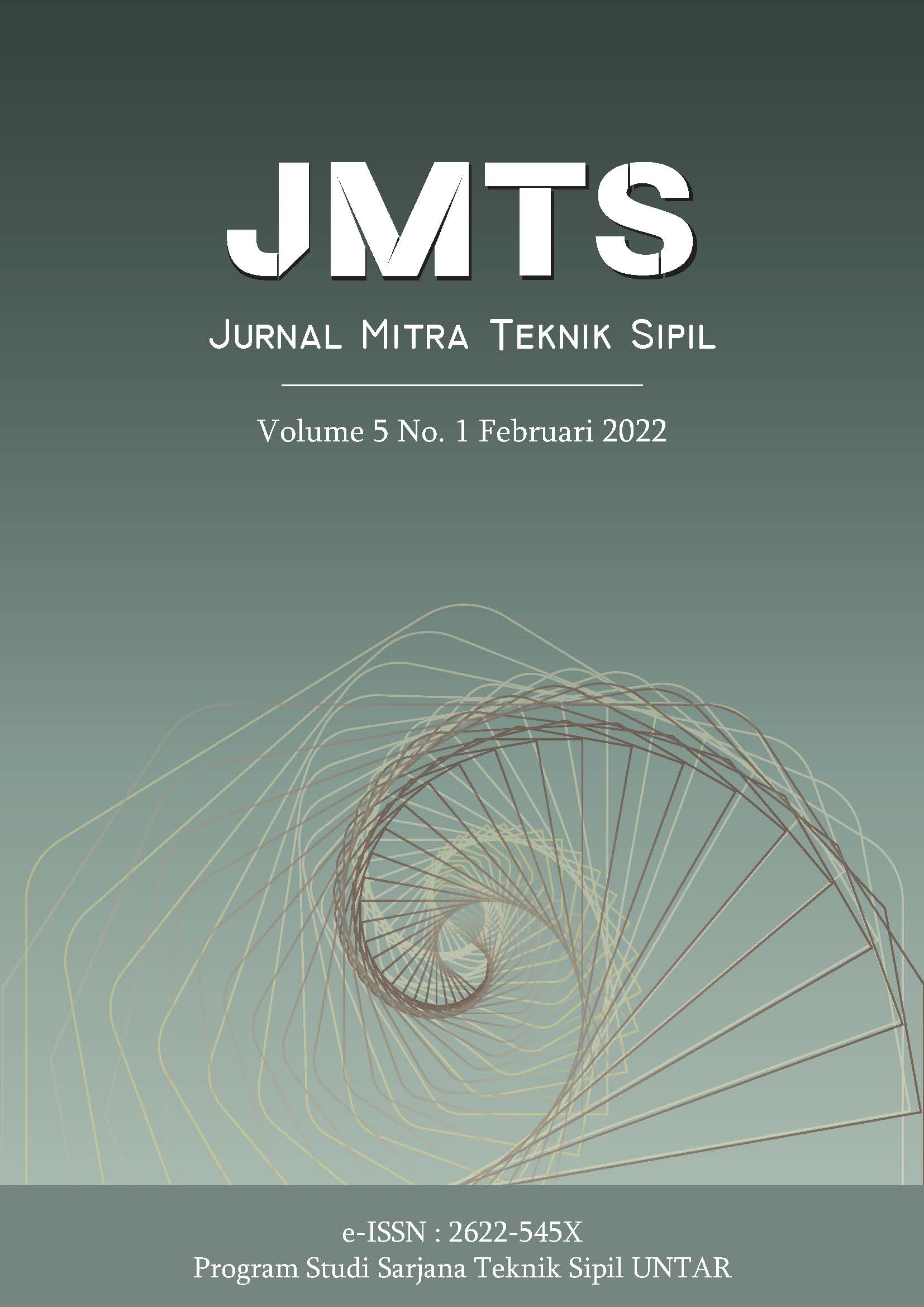PENJADWALAN PROYEK GEDUNG SEKOLAH DI SURABAYA MENGGUNAKAN OPTIMASI TIME-COST TRADE-OFF DENGAN DISCOUNTED CASH FLOW
Main Article Content
Abstract
In construction projects, time and cost factors are the keys to the success of a project. Project scheduling plays an important role in it. The Time-Cost Trade-Off method is a project scheduling technique using the Critical-Path Method which aims to find the optimum project duration, which is the duration with the minimum total cost. To get the minimum total cost, the addition of Direct & Indirect Cost should be made as small as possible. The usual Time-Cost Trade-Off does not take into account the time value of money. The time value of money has an effect on cash flow in a project. Therefore, a Time-Cost Trade-Off analysis is needed that takes into account the time value of money (Discounted Cash Flow). Future costs must be equalized to the same point in time or we can say the present time (when the project start time). The main purpose of this study is to determine the effect of time value of money on the minimum cost and optimal duration of a project. In the object of this research, the scheduling that is made after calculating the discounted cash flow will result in a smaller minimum total cost with an optimum duration.
Pada proyek konstruksi, faktor waktu dan biaya merupakan kunci keberhasilan suatu proyek. Penjadwalan proyek ikut berperan penting di dalamnya. Metode Time-Cost Trade-Off adalah teknik penjadwalan proyek dengan menggunakan Critical-Path Method bertujuan untuk mencari durasi proyek yang optimum, yaitu durasi dengan biaya total yang minimum. Untuk mendapatkan biaya total yang minimum, maka penambahan Direct & Indirect Cost harus dibuat sekecil mungkin. Time-Cost Trade-Off yang biasa dilakukan tidak memperhitungkan nilai waktu terhadap uang (time value of money). Nilai time value of money berpengaruh pada arus kas pada suatu proyek. Oleh karena itu, diperlukan suatu analisis Time-Cost Trade-Off yang memperhitungkan nilai waktu terhadap uang (Discounted Cash Flow). Biaya di waktu mendatang harus disetarakan ke titik waktu yang sama atau bisa dikatakan waktu sekarang (saat waktu mulai proyek). Tujuan utama penelitian ini adalah untuk mengetahui pengaruh time value of money terhadap biaya minimum dan durasi optimal sebuah proyek. Pada objek penelitian ini, penjadwalan yang dibuat sesudah memperhitungkan discounted cash flow akan menghasilkan biaya total minimum yang lebih kecil dengan durasi yang optimum.
Article Details
Section
References
Aladini, K., Afshar, A., & Kalhor, E. (2011). “Discounted Cash Flow Time-Cost Trade-Off Problem Optimization; ACO Approach.” Asian Journal of Civil Engineering (Building and Housing). 12(4), 511-522.
Ammar, M. (2005). “Discussion of ‘Flexible model for time/cost tradeoff problem’ by John Moussourakis and Cengiz Haksever.” Journal of Construction. Engineering and Management, 131(8), 942.
Ammar, M.A. (2011). “Optimization of Project Time-Cost Trade-Off Problem with Discounted Cash Flows.” Journal of Construction. Engineering and Management, 10.1061/(ASCE)CO.1943-7862.0000256(2011)137(1) (2011):65-71.
Crowston, W. (1970). “Decision CPM: Network reduction and solution.” Oper. Res. Q., 21, 435–452.
Elbeltagi, E., Hegazy, T., and Grierson, D. (2005). “Comparison among five evolutionary-based optimization algorithms.” Adv. Eng. Inform, 19(1), 43–53.
Moussourakis, J., and Haksever, C. (2004). “Flexible model for time/cost tradeoff problem.” Journal of Construction. Engineering and Management, 130(3), 307–314.
Popescu, C. M., & Charoengam, C. (1995). Project Planning, Schedulling, and Control in Construction, John Willey & Son, Canada, 188.
Rizal, A. (2017). “Optimasi Penjadwalan Proyek Konstruksi dengan Menggunakan Metode Time-Cost Trade-Off.” Journal Universitas Muhammadiyah Palu, 1, 1-10.
Trading Economics, (2021), Tersedia online di https://tradingeconomics.com/indonesia/indicators, (Diakses pada 1 Desember 2021).
White, J., Case, K., Pratt, D., & Agee, M. (1998). Principles of Engineering Economic Analysis, 4th Ed., Wiley, New York.
Yang, I. (2007). “Using elitist particle swarm optimization to facilitate bicriterion time-cost trade-off analysis.” Journal of Construction. Engineering and Management, 133(7), 498–505.

